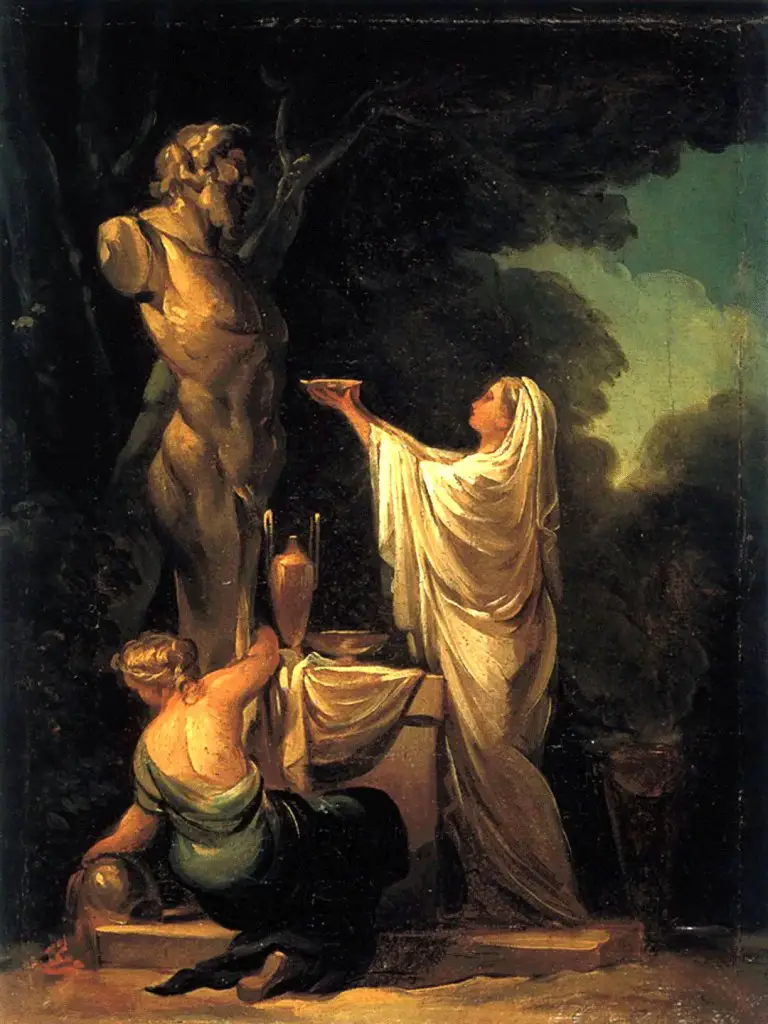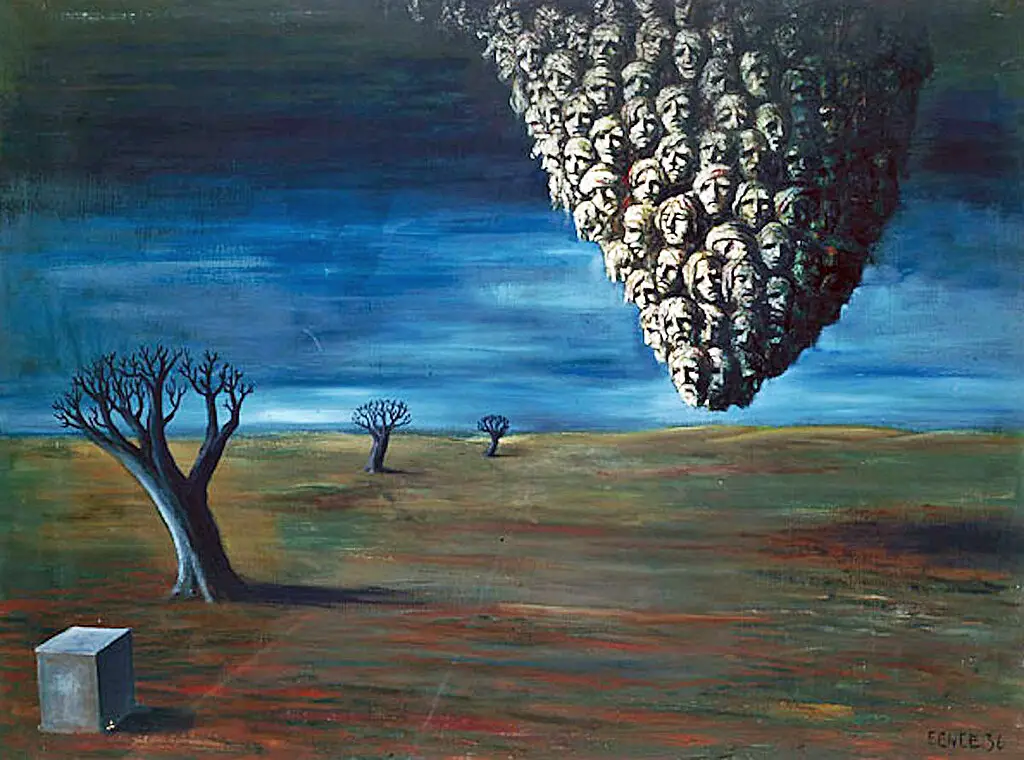«The god of places is the recognition that through the invisible character of the place it is possible to access wider contents. That is, that the god of the place is able to relate us to a deeper plane of reality and of the psyche that transcends the single site or individual.or". Let's go back to talking about Stefano Cascavilla's essay "The god of crossroads", recently released for Exorma, and already presented in June on our YouTube channel.
di Marco Maculotti
Cover: Carl Wilhelm Kolbe, Sacrifice au Dieu Pan, 1811
A few weeks ago we had the pleasure of having a guest on our YouTube channel Stephen Cascavilla, author of the essay recently published by Exorma Editrice The god of crossroads: no place is without genius. In just under ninety minutes we were able to expose the main themes of the work, first of all the widespread conception of the "divinity" of the place in traditional cultures and its progressive abjuration by modern man, especially Western man. . Here we will underline other points for reflection pinned down by Cascavilla, on which we find ourselves in perfect agreement.
The immense number of protective divinities of the crossings mentioned in the first chapters of the work - that is to say the initial research that gave the "the" to this essay, which nevertheless then significantly expanded during the writing phase up to include related topics such as, for example, the sacralization of places through ritual e a very vast group of tutelary deities of places, natural as well as domestic - for the author it is the confirmation of a truth that he sensed irrationally, yet in a definite way, even before starting his "search": that is to say that for millennia the Genius Loci it has been an absolute reality for humanity, as much as the fact that the grass in the fields in spring is green.
Hermes, Hecate, Janus, Eshu, Legba, the Djinns and the Bohemian Jan Nepomucky they are only the first gods reported by the author. As already mentioned, dozens and dozens will follow, scattered among the various chapters of the work: divinities of crossings, hills, caves, springs, woods, rivers, the home, and so on. Servio Mario Onorato, in his Comments on Virgil's Aeneid published in the XNUMXth century AD, he wrote that Nullus locus sine genio est! ("No place is without a genius"): Cascavilla after 16 centuries of Christianity, secularization, enlightenment and rationalism reaches the same conclusion, first with intuition and only later with the study of the folklore and beliefs of pre-Christian peoples:
«Vocatus atque non vocatus, Deus adheritSaid the oracle of Delphi: the god - even that of crossroads - will be present in any case, whether called or not, whether you recognize him or not.
[P. 20]
This is the starting point for a reflection based on ontological difference between the mindset of traditional man and that of modern man towards nature and more generally of space understood in the sacral sense, as a potential meeting place between the individual who knows how to "listen" and more subtle and elusive intelligences, often inherent in a specific type of place or even in a precise place defined by tradition. Traditional man, Cascavilla writes, "is aware that next to him lives an otherness that man is not allowed to see with his eyes but which is true and real like his children or his house" [p. 35]. It's still:
Recognizing the genius of the place means recognizing the limit of the human condition in front of its divine quality; the provisional nature of human purposes in the face of the invisible forces that hover around it.
[P. 17]

It goes without saying, following this reasoning, that the soul perdition of modern man derives on the one hand from being progressively detached, as Humanity, from what the native North Americans define "The Sacred Circle of the Cosmos", the established order, visible and invisible, which governs the temporal rhythms and spatial subdivisions not only of nature in a geological sense but of the entire cosmic manifestation, from galaxies and supernovae to the smallest grain of sand; on the other - "Ritual flaw" strictly connected to the first - to have placed us alone, always as Humanity, at the center and at the apex of the new vision of the world, secularized and in step with the times and the achievements of science and technology, ignoring the transcendental powers that are have been the basis of our worldview for millennia and, together with them, the pantheistic conception of divinity that perhaps only the Romantic in the last few centuries they have been able to recover to a small extent. "The contemporary city has finally freed itself from the slavery of the center, from the straitjacket of identity", concludes Cascavilla citing Koolhaas [p. 76].
But, he stresses, “man is a complex problem, an aspirin or city lights, however sparkling they may be, are not enough for him to live in equilibrium. Even the stars, the silence, the gods, the Cosmos continue to serve him. Ultimately, he needs a 'sense' "[p. 30]. And he adds: «The place is what is around us, in balance between the abysses of the infinitesimal (the earth) and the immeasurable (the sky). Human measure is the measure of this balance "[p. 65]. In this sense, the modern world (and even more the post-modern one) appears to the author as one "Counter-initiatory crusade", more or less aware, against the genius of the place, and we can only fully agree with him. Even the analysis of modern urban planning, especially when compared with ancient geomantic disciplines such as eg. the Chinese one of feng shui, leads us to the same conclusion: today's metropolises, as they had already understood among the others HP Lovecraft e Tiziano Sclavi, legitimately rise to new hells 2.0.

It goes without saying then, starting from the axiom that "the distinction between traditional and modern is the psychic relationship that man weaves between his own conscience and the Cosmos", That in order to get out of the impasse of modernity and of" non-sense "one has to do nothing but try to"recover the traditional man within us, hidden under the fragile modern patina and go back to seeing what our eyes refuse to see "[pp. 26-27]. An attempt that the author has tried and still tries to implement in first person, retracing the millenary European sacred paths in the footsteps of Genius Loci, hoping to be able to hear his ineffable voice once more, in the rustle of leaves or in the flow of a stream.
An experience that Cascavilla defines, referring to a tested terminology, participation mystique: «In this condition the ego has no precise boundaries but merges with the surrounding nature. The psyche is not only in the subject: it is widespread in the forest, in the thunder, in the mountains. The distinction between the psychic and physical spheres is blurred and nuanced "[p. 28]. What was said by james hillman - author cited not by chance in this work - in relation to the profound meaning of the Japanese garden: he who walks there, he argued, is as if he were walking in his own soul: "In that garden, I was in the psyche". Hence the realization that the Soul, far from being limited by the physical and psychic barriers of our self-styled individuality, lies all around us experiencers, like an invisible ocean that surrounds us and in which we can stroll in the evening.
The soul is not a simple and homogeneous substance: it is a compound and consists of many layers. Above the layers of which the individual is aware, there is a further layer, the "true soul", which is immeasurably superior to the soul as we know it.
[cit. Plutarch, p. 147]
Cascavilla finds it difficult to translate this experience into an Italian term, and therefore after a French one, here is a German one that can help the reader to better understand in what light to understand, from a perspective still valid today, the genius of the place: Mood, that means "The state of mind, the mood, the voice of the place that speaks and presents itself" [pg. 60].
It is therefore at the same time a power inherent in the place itself, and which however is not merely contained in it, since "it is not the individual characteristics that make up the essence of a place, but something different, immaterial, unitary that it is not obtained from the sum of the parts but from perceiving them all together, as a totality "[p. 59]. But, at the same time, this invisible power usually manifests itself to human consciousness out of the blue, in a well-defined instant, that precise instant and not another preceding or following: «The place manifests itself in a detail […] a different point, a discontinuity. You yourself who are there, you understand only suddenly, as for a gift, at the unexpected appearance of that 'something' "[p. 62]
Remember Picnic in Hanging Rock, a novel by Joan Lindsay from which Peter Weir drew his film-masterpiece? "There is a right time and place for everything to have a beginning and an end», Says at a certain point the protagonist Miranda in a" mysterious "tone, not to say" initiatory ". We have spoken extensively about this in due place and we direct anyone interested to learn more: here the quotation was necessary because this intuition of Cascavilla, like so many others in this text, seems to us perfectly consistent not only with traditional data, but even with certain "superior" products of modern art such as the aforementioned Weir film, almost to to validate the possibility of learning sacred knowledge through artistic inspiration alone (however well known and widespread phenomenon in the entire riverbed of the traditional conception of art, although obviously with the necessary differences).
The god of places […] is the recognition that through the invisible character of the place it is possible to access wider contents. That is, that the god of the place is able to relate us to a deeper plane of reality and of the psyche that transcends the single site or individual.
[P. 117]

[…] Sacred space is not simply different from profane space: it has, for those who recognize it, an ontologically superior quality that places it on another level than that of the material world. It is a hook, an opening, a contact with a new plane of reality. A plan perceived as far more important than the visible one, because it is the only one capable of making sense.
[P. 73]
The studies of Mircea Eliade, understandably, have largely led Cascavilla in the analysis of the millennial relationship that the human being, both as a community and as an individual, has intertwined throughout history with the genius of the place: especially the notions of "Sacred space" and "diversified" (mirroring those concerning time in the Eliadian work, as opposed to profane space / time, not suitable for sacred rites and experiences), and that of "Center".
If for millennia traditional man has found his own deepest center only and uniquely "connecting" with the spirit of the place, the modern one has erected himself, and moreover in its most sterile and coarse aspects, at the center of his own pedestal, downgrading the place (and with it the genius who inhabits it) to a mere postcard view, good to watch - we could say paraphrasing Lévi-Strauss - but not so good to relate to it with the maturity, now lost, that man had when he was young.


2 comments on “The god of crossroads: no place is without genius"